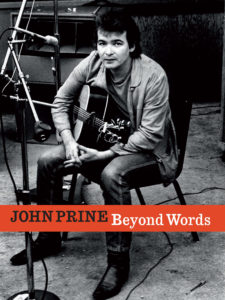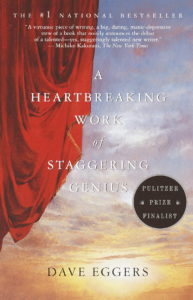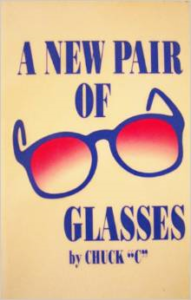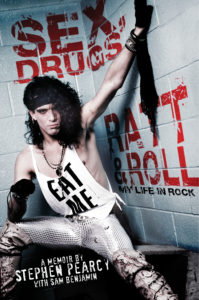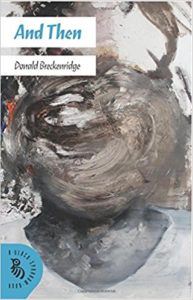 Donald Breckenridge is the author of four novels and the editor of two fiction anthologies. He has also served as the fiction editor of the Brooklyn Rail for the last sixteen years, and is the co-founder and co-editor of InTranslation, and the managing editor of Red Dust Books. His most recent work, And Then (David R. Godine), is a haunting novella and taut meditation on the people that pass through our lives. The book sees Breckenridge announce himself as an exciting and original prose stylist, and should undoubtedly make some “best of” lists by year’s end. We recently talked to him about the intersections of music and literature in his life.
Donald Breckenridge is the author of four novels and the editor of two fiction anthologies. He has also served as the fiction editor of the Brooklyn Rail for the last sixteen years, and is the co-founder and co-editor of InTranslation, and the managing editor of Red Dust Books. His most recent work, And Then (David R. Godine), is a haunting novella and taut meditation on the people that pass through our lives. The book sees Breckenridge announce himself as an exciting and original prose stylist, and should undoubtedly make some “best of” lists by year’s end. We recently talked to him about the intersections of music and literature in his life.
Angel City Review: Did your passion for music precede your passion for literature?
Donald Breckenridge: I don’t remember which one came first but some of my earliest memories are shaped by music and also having my father read to me before bed. When we lived on the Naval base in Philadelphia when I was around four I had a portable turntable in my room with some Disney records, also those Viewmaster reels with their accompanying records—Spiderman, Yogi Bear and the like—and a copy of Johnny Horton’s Greatest Hits, which had “North to Alaska” on it and now, whenever I think about living there and playing alone in my bedroom, it is almost always accompanied by that song.
ACR: Who were some of your musical and literary heroes growing up?
DB: In elementary school I would have said Jimi Hendrix—who I still adore—and in junior high I would have said Lou Reed—I still listen to the Velvets all the time—although when I was in junior high in ’81-’83 hardcore was immensely popular. Albums by Channel 3, Black Flag, GBH, Circle Jerks, that This is Boston Not LA compilation and that Maximum Rock and Roll compilation, Not So Quiet on the Western Front were constantly changing hands in my remedial math class, in study hall (that I took so I could read novels during school without getting yelled at) and on the back of the bus. I didn’t really embrace hardcore until the Bad Brain’s Rock For Light came out although I first heard it through a post punk filter of mainly English bands as I was really into: Joy Division, Gang of Four, The Fall, Bauhaus, Cabaret Voltaire, PiL and The Cramps by then. In high school my musical heroes were Mark E Smith, HR, John Lydon, Ian Curtis, Richard H Kirk, John King and Lux Interior. It was around this time that I moved from Virginia Beach to Alexandria and began going to punk shows just across the Potomac in DC. I saw a ton of great music then—lots of DC hardcore (although ’85 turned out to be the twilight for hardcore) and bands from NYC, LA and also English groups were constantly blowing through town so I was really in the right place at a great time for new music. In high school I was reading a lot of Huxley, Mailer, Kerouac, Kafka, Burroughs, Celine and Genet.
ACR: Would you say the DIY ethos / the aesthetic of punk inspired your creativity early on? Or did you get your creative inspirations from elsewhere?
DB: The DIY ethos of that era absolutely, and to this day, not just with writing but also how I present my work to the world. Whereas the punk aesthetic at the time was extremely important, and anger is something that you should never lose your capacity to embrace. However, beauty, love, and emotional honesty will enable you to thrive in the world because anger cannot sustain itself for very long. For me and for many other people, punk was a compass that enabled us to find a singular path.
ACR: Did your creativity initially manifest through writing or were you driven to start a band like so many kids immersed in post-punk, hardcore at the time?
DB: I was far too aloof to try and form a band, although that’s not to say that I didn’t have a few friends who could have made music together if we had put an effort into it but we were seriously invested in making art: photography, painting and later performance art. We would critique each others work, consume the same authors, loved the same bands, immersed ourselves in galleries and for a time it was a secure and nurturing bond. I wanted to be a photographer before I started writing. My creativity initially manifested itself behind a lens and soon after through the theater yet I couldn’t afford to make the art that I wanted to here so gradually, glacially, I found the courage to begin writing fiction.
ACR: In an interview I’ve read from a few years back, you mention that you wrote your novel This Young Girl Passing with music and certain films on in the background to immerse yourself in the era. Do you still write this way?
DB: Absolutely yes, with And Then I wrote most of the late 70’s era section with Television’s Marquee Moon and the 1st Gary Newman and the Tubeway Army album playing constantly in the background. I was really going for something cold—blithe yet psychedelic and angular, haunting and brittle. While writing out the late 80’s era section I spent a lot of time listening to Malcolm Mooney era Can, Captain Beefheart’s Doc at the Radar Station and mid-60s era Coltrane. I was searching for something haunting and spontaneous while at the same time it had to be completely visceral and kaleidoscopic. While much of the autobiographical section was spent listening to the post-punk from my teens as well as lots of records by the Television Personalities. Ultimately I was trying for something nostalgic that would sound and feel like every guitar solo Daniel Treacy stole from Roger McGuinn… and also a ton of Gamelan recordings from Java and Bali.
ACR: How much does the music you enjoy inform your narrative style? If at all?
DB: Music immensely informs my narratives and it has since my first attempts at writing plays nearly three decades ago when I would have Coltrane Plays the Blues on repeat whenever I was writing dialog. So much of writing well is in listening and if you cannot hear what your characters are trying to convey then you will never be able to present them convincingly on the page. Listening to music and constantly seeking out new sounds enables you to hear and respond accordingly to your character’s motives and objectives as they continuously evolve throughout the narrative.
ACR: What are some albums that are inextricably tied to New York City for you?
DB: John Coltrane: Crescent
Bob Dylan: Blonde on Blonde
Duke Ellington, Max Roach and Charles Mingus: Money Jungle
The Velvet Underground: White Light/White Heat
Archie Shepp: Attica Blues
The Rolling Stones: Some Girls
Cabaret Voltaire: Red Mecca
Can: Tago Mago
Compound Eye: Journey From Anywhere
Albert Ayler: Spirits Rejoice
Sonny Rollins: Saxophone Colossus
John Cage & Kenneth Patchen: The City Wears a Slouch Hat
Valis l: Destruction Of Syntax
The Fall: Perverted By Language
Art Blakey’s Jazz Messengers: With Thelonious Monk
Alice Coltrane: Ptah, The El Daoud
Miles Davis: On The Corner
Richard Hell and the Voidoids: Funhunt: Live At CBGB’s and Max’s 78/79
The Ramones: The Ramones
Johnny Thunders: So Alone
Luc Ferrari: Electronic Works
The Clean/Great Unwashed: Odditties 2
The Stooges: Fun House
ACR: You have mentioned that you are an avid record collector. Is there a record that started it all for you?
DB: My mother recently sent me her Elvis Presley albums from when she was a teenager. In the box she also included the 1st album I ever bought which was a copy of You’ll Never Walk Alone, that Elvis recorded with The Jordanaires in ’71. It’s a full-on unapologetic gospel album so many would argue that my first attempt at buying music was a proper swing and a miss. I guess that purchase taught me to be a bit more careful with my limited funds. When I moved to NYC when I was twenty I made the mistake of bringing all of my records with me and soon afterwards I had to sell them in order to eat, although I got next to nothing for them, so for a number of years I subsisted on cut-out bin cassettes and listening to WKCR, as that station is an absolute blessing and introduced me to jazz and classical music. I began collecting records again in earnest about 15 years ago and now I have a few thousand albums.
ACR: Some people argue that New York City lost its “edge” years ago. Some people believe this has had an affect on the arts scene there as well (music / lit / etc). Do you believe this is true?
DB: I think the city is constantly changing and no scene in NYC has ever remained in the same place for a very long time. It might have been cheaper to live here in the late 80’s when I moved here but if you have absolutely no money after making rent it is next to impossible to survive anywhere. Trust me on that because getting by here on a few dollars a week is no fucking joke and carving out enough time to create your art while working 40 hours a week takes nearly inhuman sacrifice. I’m sure that is true everywhere and yet art frequently happens anywhere because it absolutely has to. I think some people who claim the city has lost its edge are nostalgic for their loft dwelling twenties in that now misty golden era before Brooklyn became a global brand name. Or they never lived here in the first place. However getting older while watching your neighborhood change to the point where it is hardly recognizable from when you first moved in can be soul crushing. And having to move every few years to find cheaper rent sucks. I moved eight times in my first decade here. I lived in a really beautiful African-American neighborhood with a solid civic foundation during the height of the crack era and watched as a dwindling lack of social services; affordable supermarkets, reliable public-transportation, horrific schools, dysfunctional hospitals, daily shootings and a community-phobic police force drove nearly all of the long-term homeowners away before the banks and realtors swooped in to re-brand the neighborhood for a more affluent group of people who themselves were recently priced out of wherever it was they were coming from. The neighborhood where I live now is rapidly gentrifying and while the property values are soaring it isn’t getting that much better for the families who have lived here for generations. Every week I get calls from aggressive realtors with their all cash offers to buy our house and I positively relish the opportunity to tell them to fuck off.
ACR: Your prose style (dialogue in particular) is incredibly unique to me in the way that it breaks up the narrative line. It creates a really vivid experience, especially in your new book And Then. Is style something that is self-conscious to you or is it something that you don’t think about much?
DB: I write very slowly—if I get five lines in a day that is a great writing day—and then spend weeks cultivating the spaces around the sentences. Narrative switchbacks, visual displacements and dialog that breaks through the lines—like weeds coming up through the cracks in the sidewalk—gradually overtake those spaces. I am always trying for vivid while keeping things present, so thank you very much for saying that.
ACR: What are you currently working on?
DB: I’m working on a retelling of Sophocles’ Theban Plays. A short version of Antigone was published over at Fjords Review in the spring of ’16 and I am currently working on a longer version of Oedipus right now. What I’m attempting is a novel length triptych of King Oedipus, Oedipus at Colonus and Antigone.
————-
Purchase And Then on Amazon.

